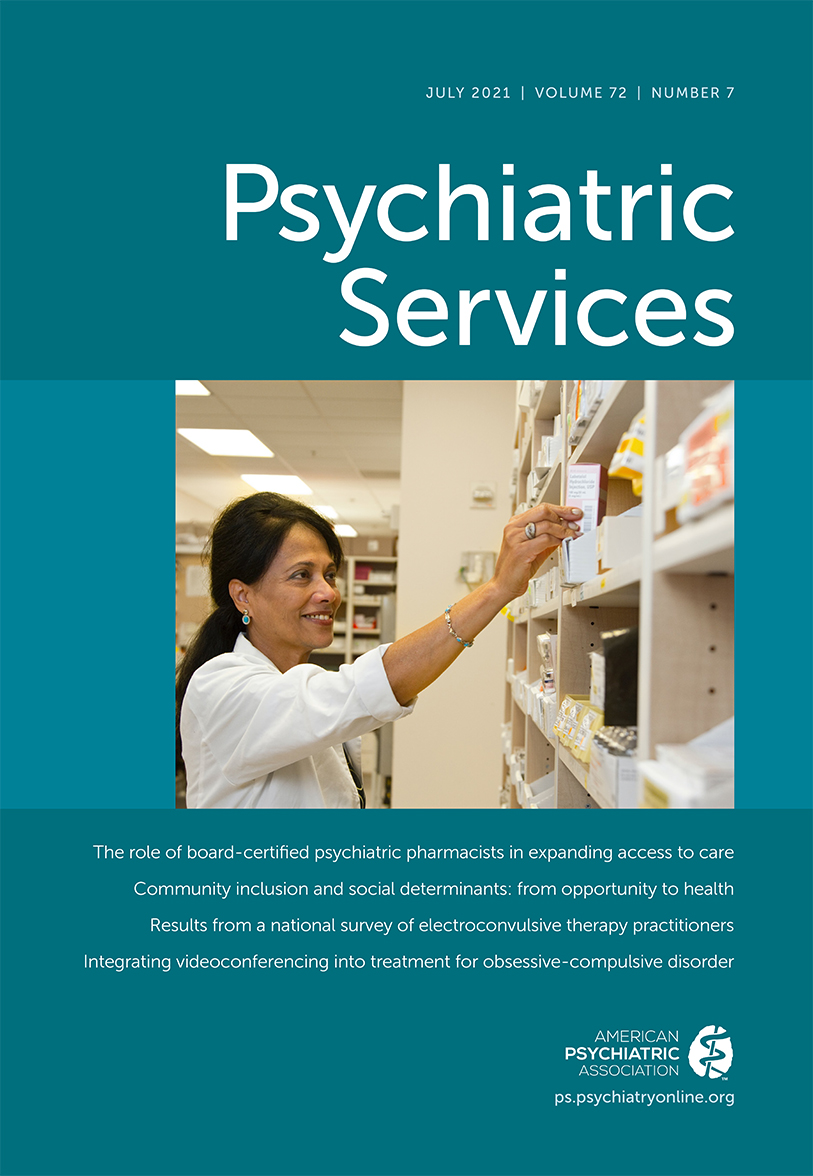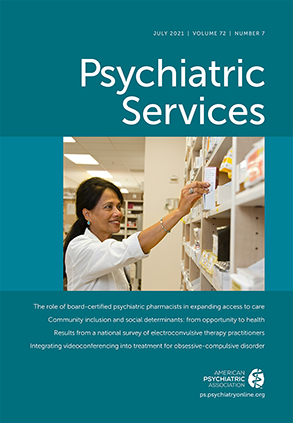The United States is facing an unprecedented opioid epidemic. Despite the availability of medications approved by the U.S. Food and Drug Administration (i.e., methadone, buprenorphine, and naltrexone) to treat opioid use disorder, most individuals with opioid use disorder are not receiving care, and many of those receiving care do not receive pharmacotherapy (
1). Understanding the characteristics of individuals with opioid use disorder, improving the quality of their care, and discovering more effective treatments are important steps in addressing the country’s opioid overdose epidemic.
Many patients with opioid and other substance use disorders receive treatment in office-based practices beyond the bounds of specialty substance abuse treatment programs. Yet relatively little is known about the patient characteristics, services delivered, and treatment outcomes of such practices. This knowledge gap is a missed opportunity to gather important data on treatment in real-world practice settings, to organize data for performance improvement activities, and to study the effectiveness of novel treatments. The Addiction Medicine Practice-Based Research Network (AMNet), a clinical data registry and practice-based research network focused on office-based practices operated by addiction psychiatrists, other addiction medicine physicians, and nonphysician addiction medicine providers, aims to address this gap.
This column describes the collaboration that led to the development of AMNet, which seeks to combine the features of a practice-based research network (PBRN) and a clinical data registry to address the opioid epidemic. Challenges to conducting clinical research in office-based practices have been tackled in oncology and psychiatry through the creation of PBRNs and clinical data registries (
2,
3). PBRNs are collaborations between researchers and community-based health care providers to design and implement studies aimed at improving patient outcomes (
4). Registries, in contrast, are used to collect standardized process and outcomes data from clinicians and patients in a particular area of interest, thus providing a unique source of longitudinal data in large patient populations and a potentially robust research infrastructure, a key goal of AMNet (
5).
Developing AMNet
The development of AMNet was launched through a National Institute on Drug Abuse (NIDA) cooperative agreement that was supported by an interagency agreement between NIDA and the Office of the Secretary, Patient-Centered Outcomes Research Trust Fund; the American Psychiatric Association (APA); the American Society of Addiction Medicine (ASAM); and Friends Research Institute (FRI). Several years prior to this effort, FRI and ASAM had agreed to create an addiction medicine research network but had lacked funding. Independently, the APA had formed its own plans to use its previous experience in developing a PBRN and its recently launched qualified clinical data registry (PsychPRO) to develop a practice-based addiction medicine research network that would identify and inform high-quality care for patients ranging from those with emerging symptoms of substance misuse to those with substance use disorders. In identifying their shared vision, the partners met via a series of teleconferences and coordinated their efforts in a successful grant application to fund the development of AMNet. The partnership among the APA, ASAM, and FRI leveraged the distinct strengths of each organization (e.g., APA’s expertise in the development of a data registry and PBRNs, FRI’s experience in conducting opioid use disorder treatment research, and ASAM’s expertise in clinical care and quality improvement).
Goals and governance.
AMNet’s goals are to capture timely clinician- and patient-reported data relevant to the opioid epidemic and derived from routine practice, to drive performance improvement efforts, and to develop a research network for community-based pharmacotherapy and service delivery intervention trials.
AMNet’s infrastructure consists of two main committees (executive and steering) that work to maintain a strong partnership through continued communication. The executive committee, composed of AMNet’s investigators from FRI, APA, and ASAM and a NIDA science officer, meets weekly to oversee the development and implementation of AMNet. The executive committee members formed separate work groups to address issues such as recruitment, data, research policy, and provider education. These work groups report on their progress at the weekly executive committee meetings. The steering committee, which includes external addiction medicine and addiction psychiatry clinicians and researchers, a patient advocate, and two federal representatives, holds annual in-person meetings and conference calls every other month with the executive committee to help guide selection of patient assessment tools and quality measures, recruitment strategies, research policies and procedures, and prioritization of research questions.
PsychPRO.
AMNet is being built on the foundation of PsychPRO, a robust quality improvement tool developed in a partnership between the APA and the Featherstone Informatics Group, a health information technology firm that is compliant with the Health Insurance Portability and Accountability Act and certified by the U.S. Department of Health and Human Services Office of the National Coordinator for Health Information Technology. PsychPRO’s flexible data collection methods allow for integration with electronic health records to obtain patient- and provider-level data. PsychPRO’s portals gather patient-reported and clinician-rated outcome measures. The patient portal provides real-time and historical feedback of patient-reported outcome summary scores to enable clinicians, via the clinician portal, to conveniently screen patients, track progress, and monitor treatment effectiveness over time. Also, PsychPRO’s online dashboards provide timely feedback using performance data.
The APA’s experience in recruiting PsychPRO users and FRI and ASAM’s access to office-based practices guided parameters for practice inclusion. Lessons learned from previous experiences informed the development of effective recruitment strategies and materials, such as a web page with links to program reference guides and publications, educational resources for grant participants, and prioritized mail outreach to generate a greater response to meet recruitment goals. The goal over the next 2 years is to recruit 120 eligible providers and/or practices that offer addiction treatment. These practices can vary in size (solo or group), provider type (primary care clinicians, such as physicians, physician assistants, and nurse practitioners; psychiatrists; addiction psychiatrists; and addiction medicine specialists), and geographic location. Providers are being recruited through APA, ASAM, and American Academy of Addiction Psychiatry memberships, publications, conference presentations, social media, and Listserv outreach. Providers are not required to be members of these organizations.
Assessment and quality measures.
AMNet’s common data elements, collected via PsychPRO’s portals and extracted from electronic health records, will consist of deidentified patient demographic data, medications, drug test results, patient assessments, and patient-reported and clinician-rated outcomes.
AMNet offers standardized patient-reported and clinician-rated baseline and follow-up assessments and quality measures. The AMNet partners used their registry, clinical, and research experience to build a multistage approach to identify and finalize the domains of interest and the associated assessments and quality measures for inclusion in the PsychPRO portal. First, a measures subcommittee was formed to conduct a scoping review to identify the domains of interest and associated candidate assessments that were brief, clinically useful, in the public domain, and possessed sound psychometric properties. Next, executive committee members had an open review and discussion of the results prior to a final review and approval by the steering committee.
The executive committee also conducted an environmental scan of quality measures for opioid use disorder treatment. To be included, quality measures had to be extractable from electronic health records of typical practices, used in the field, and associated with favorable treatment outcomes. Because they met all of these criteria, the quality measures of the Center for Care Innovations (
https://www.careinnovations.org) were adopted for use in AMNet.
Feasibility and validation testing
The feasibility of collecting AMNet data elements with PsychPRO and their validation will be assessed during the early phase of the network’s development by using a combination of quantitative and qualitative methods. Continued feasibility testing will assess practice workflow impacts and will consist of a clinical utility questionnaire and provider debrief interviews.
Discussion and Conclusions
The partner organizations have brought a combination of strengths, experience, and resources to bear in creating AMNet. APA and ASAM have large, active provider networks and extensive experience in reaching their respective members via websites, Listservs, strategic e-mail cascades, social media, and conferences. APA is applying its experience in recruiting providers for PsychPRO to the recruitment of AMNet providers. APA (through its Council on Addiction Psychiatry), NIDA, ASAM, and FRI used their knowledge of addiction treatment and research to inform selection of measures, and all partners used their extensive professional networks to form an expert steering committee. AMNet’s participating providers will be invited to take part in educational webinars led by the partners that will cover topics such as human research protection, research methods, cutting-edge research findings, and clinical care relevant to opioid use disorder treatment. Thus, the partners’ complementary strengths will enhance the development and future success of AMNet.
During the grant period, AMNet will work with NIDA to explore creating collaborations between AMNet providers and extramural researchers to enhance the reach of practice-based addiction research. After the end of the 3-year grant award, the network could be sustained through funding obtained from extramural agencies, industry, and foundations.
AMNet strives to help address the opioid epidemic as well as the nation’s other current and future substance use disorder challenges. Its success will depend on continued strong collaboration among its founding partner organizations.
Acknowledgments
The authors thank the external steering committee members (Karen Drexler, M.D., Walter Ling, M.D., Brian Hurley, M.D., M.B.A., Emily Jones, Ph.D., Anita Everett, M.D., and Vikram Chiruvolu, M.A.) for their guidance.

